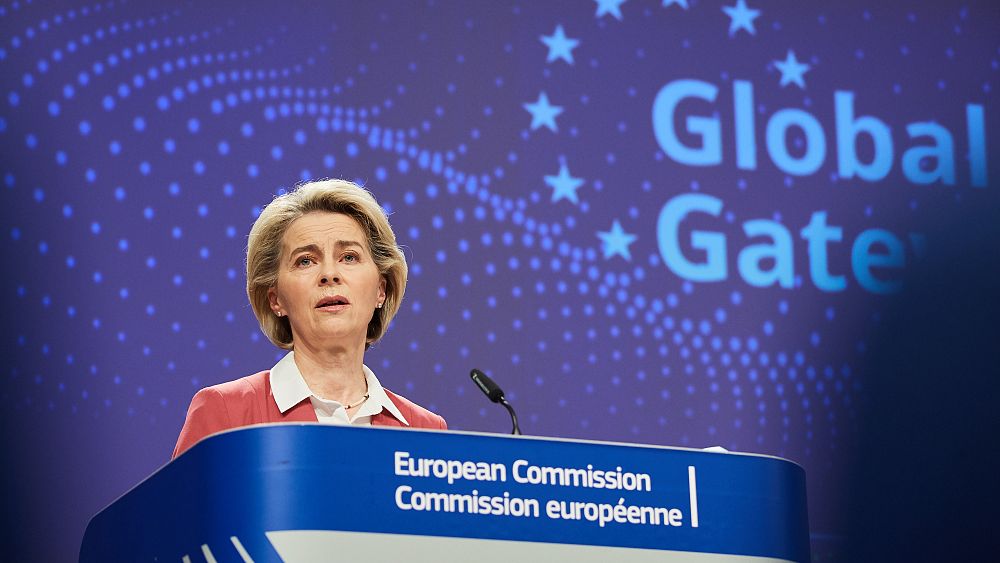
Brussels has announced plans to raise up to €300 billion to counter China’s infrastructure spending around the world.
The money will help poorer countries build highways, pipelines and broadband networks.
The move is a response to China’s Belt and Road Initiative (BIR), a massive collection of infrastructure projects across the globe that has served to fortify Beijing’s foreign policy and soft power.
Named Global Gateway, the European enterprise is meant to bring in the necessary investment to manage worldwide challenges, such as the fight against climate change and the security of supply chains. The scheme promises to promote high social, environmental, fiscal and labour standards.
“We want to make Global Gateway a trusted brand that stands out because of high quality, reliable standards and high levels of transparency and good governance,” said Ursula von der Leyen, President of the European Commission, presenting the plan on December 1.
Von der Leyen didn’t specify which projects will be supported but named some potential ventures, like clean hydrogen, submarine data cables, transport links and schools.
Global Gateway faces an uphill battle to outweigh the Belt and Road Initiative.
Since its launch back in 2013, China’s BIR has amassed 139 participant countries, including several EU member states, that represent 40% of the world’s GDP, the Council of Foreign Relations (CFR) estimates. In 2019, Italy became the first – and so far only – G7 country to sign a non-binding memorandum related to the project.
BIR agreements are often opaque and secret, making it hard to assess how much China has already spent in infrastructure. A 2018 study by Morgan Stanley predicts the cross-border undertaking will result in $1.2 or $1.3 trillion by 2027 and will serve to accelerate China’s transformation into a high-income economy.
By contrast, Brussels is betting on a smaller amount of money – €300 billion spread over the next six years – that will be focused on “values-based” partnerships. The money will be pooled from the EU budget, financial institutions, member states and the private sector.
‘A true alternative’
Speaking to reporters, von der Leyen didn’t try to mask the EU’s intention to rival China in the global race to close the infrastructure gap, which the G20 estimates will reach €13 trillion by 2040.
The Commission chief called Global Gateway a “true alternative” to the Belt and Road Initiative that will put participant countries on an equal footing, rather than in a subservient arrangement.
China has been often criticised for forcing low-income countries into loans that then turn into crippling debt that poisons public finances. Beijing strenuously rejects these accusations and stresses the deals are always collaborative and mutually beneficial.
Earlier this year, Montenegro infamously asked the Commission to help pay off a $1 billion Chinese loan that the Balkan country had taken to build a highway. The executive declined the request.
“Countries made their experience with the Chinese investments. They need better and different offers,” von der Leyen said.
“They know [with the EU] there will be no unsustainable debt levels as a leftover.”
Underlining the democratic dimension of the new scheme, von der Leyen said Global Gateway will be aligned with similar projects of “like-minded countries”, such as US President Joe Biden’s Build Back Better World plan and the United Kingdom’s Green Clean funding package. Setting up an alternative infrastructure project had been highlighted as top priority during this year’s G7 meeting in Cornwall.
Brussels hopes Global Gateway will serve to demonstrate the executive is an actual “geopolitical Commission”, a phrase coined by von der Leyen herself when she was elected president and often mocked as being unrealistic in Brussels circles.
Recent episodes like the hasty withdrawal from Afghanistan, a hybrid attack from Belarus and a surprising military pact between the US, the UK and Australia caught the EU off guard and portrayed it as a second-class, defenceless actor on the international stage.
The Commission is well aware hard power is not the bloc’s forte and diplomatic victories are easier to achieve through softer instruments, such as climate and digital regulation, two fields where Brussels is considered an international reference.
As the world’s largest single market, the EU wants to leverage its business weight to advance its strategic interests beyond its borders, offset Beijing’s dominance and open up new opportunities for European companies, many of which are highly dependent on exports and struggle to compete against Beijing’s state-backed giants.
Global Gateway “sends a clear signal to our trading partners and neighbours that the EU is serious about being a geostrategic player. What we need now is a rapid rollout with concrete, strategic projects which should be accessible on a basis of reciprocity,” said BusinessEurope, an industry lobby group that represents all-sized companies, in a statement.
Reinhard Bütikofer, a German MEP who chairs the European Parliament’s China delegation and has been sanctioned by Beijing, said the €300 billion was “no peanuts” and predicted the initiative will open a new chapter in “Europe’s role in international relations”.
“If you look at the approach that an authoritarian regime, a corrupt regime would take, obviously they might not be interested all that much in transparency and inclusiveness of the project or democratic scrutiny or even good environmental standards,” Bütikofer told Euronews in an interview.
“Even the discussion around Global Gateway has already had an effect on China. If people listen carefully to what’s being said from Beijing, all of a sudden [President] Xi Jinping talks about quality projects, he talks about sustainability. That’s new.”
The first opportunity to test the scheme’s international appeal will arrive in spring, von der Leyen said, when the EU and the African Union are set to hold a joint summit.
